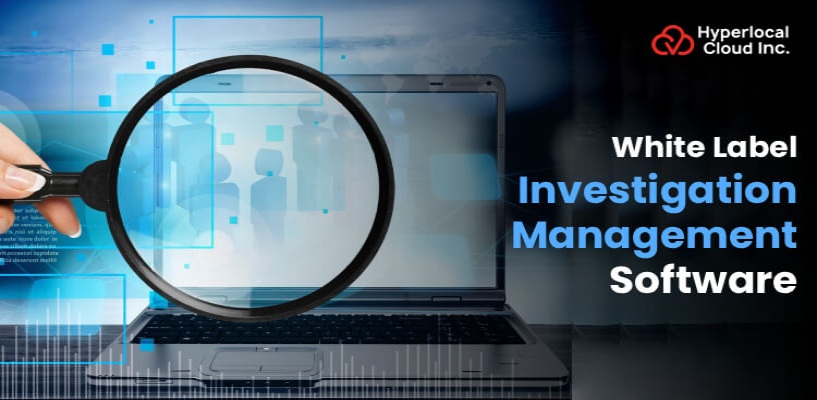White Label Investigation Management Software Solution

As the rapid growth in digitalization has been seen in the past few years, the requirement for a reliable and efficient software solution is a concern for businesses, startups, and even government organizations. This means that in cases of fraud, compliance violations, employee abuse, or cybersecurity issues, the need for a reliable system to handle such investigations has never been more important. This is where the software for investigation management should offer a full solution.
Investigation management software helps to streamline, manage, and create documents for all aspects of the survey in a structured and efficient way. The investigation management software ensures transparency, improves cooperation, and improves the decision-making process. It provides an organized platform where teams can handle sensitive information, track the progression of cases, maintain deadlines, and compile evidence.
When it comes to market growth, the global investigative software industry is expanding rapidly. In addition, there is a growing demand for white label solutions. These white label platforms allow businesses to brand software as their own. This trend in particular receives traction between private investigative companies, law enforcement agencies, and enterprise teams.
What is Investigation Management Software?
Investigation management software is a digital platform designed to support organizations in the management of a systematic and organized way. It acts as a centralized platform that allows users to collect evidence, work, track time, and generate reports related to a particular case. It reduces manual errors, eliminates paperwork, and ensures that all data related to the case is safely stored and easily reached. Many platforms come with user access control, which means that the description of the sensitive case can only be accessed by authorized personnel. This increases privacy and helps organizations to follow data on privacy.
Customize your investigation platform with our white label solution
How Does an Investigation Management Software Work?
The workflow of an investigation management software is to facilitate the users with a seamless experience. Here, you will get a detailed insight into the working model of the white label investigation management software.
1. Case Initiation
The process begins to receive information about a case. This can be done by a reporting form, an internal complaint, or an automatic notice. The system then creates a new probe file.
2. Assignment of Case
When the case becomes, the software lets different investigators or team members assign the roles and responsibilities. This ensures that the right person handles each task.
3. Data Collection and Evidence Management
The feature of data collection and evidence management enables users to upload important evidence such as documents, images, videos, and audio files. This will help users securely store data and evidence for easy access when needed.
4. Timeline and Workflow Management
The system provides a visual timeline or workflow indicating the progression of the probe. Users can trace milestones, waiting functions, and full phases of the case.
5. Collaboration Tools
Investigators can communicate with each other through the underlying chat tools or comments. This improves the coordination between team members working on the same issue.
6. Reporting and Documentation
One of the main features is the ability to generate structured reports. These reports can be used for internal reviews or can be presented to legal or regulating bodies as needed.
7. Case Closure and Archiving
When the investigation is completed, the case stops, and all related documents are stored. Software ensures that data remains available for future auditing or reference.
Unleash the Advantages of Investing in the White Label Investigation Management Software Solution
White label investigation management software provides a unique and flexible solution for organizations that want a brand platform without doing it from scratch. Using a white label approach below has some compelling benefits:
1. Cost-Effective Development
Creating a software product from the ground up requires significant investments in time and resources. With the white label software, companies get a prepared platform for a fraction of the cost.
2. Faster Time to Market
Since core functions have already evolved, the time required to customize and launch the product under your brand is very short. This allows you to quickly enter the market and start providing services.
3. Custom Branding
White label solutions let you include your brand logo, colors, and unique features, which allows your organization to fully develop the product.
4. Scalability
These solutions are often made for cloud-based and scalable. Whether you are a small test company or a large multinational company, you can expand the use without the need to overhaul the system.
5. Competitive Edge
Delivering a user-friendly white label investigation management software can improve your professional image, attract new customers, and increase the quality of your services.
Emerging Core Features of the Investigation Management Software
The investigation management software provides several emerging key features that mainly facilitate the admin panel, investigator panel, and complaint initiator panel. So, below you will get a detailed overview of the same. Just have a look:
Admin Panel
1. User Role and Permission Management
Administrators can create different user roles such as case suitors, supervisors, auditors, or external auxiliary. Access levels are determined to secure privacy and security for data.
2. System Configuration Settings
This feature allows the adaptation of the workflow to maintain the total operating requirement, automatically tailoring made-to-order fields in form and report.
3. Audit Trails and Logs
This function ensures that each measure taken in the system is logged and provides a clear audit track that can be used for compliance and legal requirements.
4. Dashboard Overview
The administrator offers a comprehensive observation of all active, waiting, and closed cases with the dashboard performance analysis and key metrics.
5. Template Management
Administrators can manage the template for communication reports, email, and information, and ensure stability in communication.
Investigator Panel
1. Case Creation and Assignment
Investigators can start cases or accept prescribed cases. They can add details, tags, severity levels, and related parties.
2. Evidence Upload and Management
With the help of this feature, the investigator can upload the essential evidence safely. Thus, the software delivers a reliable and trustworthy solution to the users.
3. Task and Activity Tracker
Work related to a case can be monitored and completed. Investigators receive reminders and information for future tasks.
4. Timeline Visualization
A visual timeline allows investigators to identify the entire course of events, interviews, and findings in chronological order.
5. Collaboration Tools
Team members can add notes, comment on evidence, and tag allies. This promotes cooperation without relying on external channels.
6. Report Generation Tools
During the case or anytime later, investigators can generate detailed reports in various forms such as PDF, Word, or Excel.
Reporter or Complaint Initiator Panel
1. Secure Case Submission
Users can submit a report through a single form. The form can be adapted to gather the necessary information, such as placement, involved people, and the nature of the complaint.
2. Anonymous Reporting Option
Users can choose to be anonymous. The system still allows communication with investigators without revealing the reporter’s identity.
3. Case Status Tracking
This feature of case status tracking allows reporters to gain updates on the case status, which helps create self-trust and encourages openness.
4. Auto-Acknowledgement
When the complaint initiator sent a report, the system automatically sent a message acknowledging the report and outlining the further steps.
Need a branded investigation solution?
Advanced Features Integrating into the Investigation Management Software
There are numerous advanced features that are integrated into the investigation management software. Go through the information below to get to know about the advanced features of the platform.
1. Artificial Intelligence and Machine Learning
AI-controlled functions help investigators by identifying data patterns, risk indicators, and behavioral deviations. ML algorithms can analyze historical data to predict potential results or recommend features.
2. Predictive and Visual Analytics
Modern platforms use future analysis to predict trends, such as an increase in the number of employees in a department. Visual dashboards show real-time data and performance insight.
3. Facial Recognition and Biometric Integrations
Advanced software platforms can integrate with biometric systems to validate the identity of suspects or witnesses. This is especially useful in the detection of fraud and high protection tests.
4. Voice-to-Text Transcription
Investigators often register interviews, meetings, or statements. Integration of speech-to-text features can automatically change audio files into written text, ensuring time savings and accuracy.
5. Mobile Access and Offline Mode
Mobile compatibility is important for field investigators. Modern platforms provide dedicated mobile apps that allow the case file, evidence uploading, and access to communication equipment, even when investigators are on the go.
6. Secure APIs and Third-Party Integration
The system often has to integrate with other devices such as HR platforms, compliance equipment, or databases. Open API access enables adapted integration with internal equipment or external regulatory systems.
Consider the Steps to Build an Investigation Management Software with a White Label Solution
Developing an investigation management software by utilizing a white label solution includes planning, collaboration, adaptation, and distribution. Have a look at the information below to know briefly about the development steps.
1. Define Your Requirements and Goals
Before pursuing the development phase, businesses need to clarify and analyze their goal, target audience, and ongoing market trends. Once you are done with the research part, it’s now time to plan everything to accurately implement it.
2. Choose a White Label Solution Provider
Research and compare providers that offer customizable investigation management software. Ensure the solution supports branding, scalability, and key features like case tracking, reporting, and role-based access. Select a provider with strong support, data security, and integration capabilities.
3. Customize the Platform
Once you have chosen a supplier, the next step is optimization. This includes adjusting the software interface with the identity of your brand and tailoring functions in the workflow. Make sure the platform reflects the operation of your company while maintaining the underlying functionality.
4. Integrate with Existing Systems
Your test software should originally work with other systems in your organization. This may include HR platforms, case databases, document stores, or communication tools. This helps maintain data continuity and increase productivity.
5. Conduct Comprehensive Testing
Before you go live, the entire platform should be well-tested. The test helps identify problems with errors, workflow, and user experience. Include the representatives of each user group to meet the software to meet their needs.
6. Launch and Support
When everything is tested and your team is trained, the software officially launches. Make sure support channels are available in case of users’ problems. Continuous support and customization help users improve satisfaction and ensure long-term success.
Tech Stack Used to Build Investigation Management Software
For the development of advanced and fully featured investigation management software, integrating the right and advanced tech stack is required. Have a look at the table below, and get an idea about the tech stack that most software development companies use to build feature-enriched software.
| Layer | Technology |
| Frontend | React, Angular, Vue.js, Svelte |
| Backend | Node.js (Express), Python (Django, Flask), Java (Spring Boot), .NET Core |
| Database | PostgreSQL, MySQL, MongoDB, Microsoft SQL Server |
| Authentication | OAuth 2.0, JWT, Auth0, Firebase Auth |
| Search Engine | Elasticsearch, Apache Solr |
| Cloud Hosting | AWS, Azure, Google Cloud Platform |
| DevOps | Docker, Kubernetes, Jenkins, GitLab CI/CD |
| Messaging/Queue | RabbitMQ, Apache Kafka, AWS SQS |
| Reporting | JasperReports, Tableau, Power BI |
| Security | OWASP tools, Snyk, HashiCorp Vault |
| Monitoring | Prometheus, Grafana, ELK Stack |
Use Cases of an Investigation Management Software
An investigation management software is a versatile platform that is utilized by a wide range of industries and sectors. It is designed to help users systematically manage the investigation regardless of subject or type of organization. Below are many detailed use cases where such software is used.
1. Corporate Investigations
Large organizations often face questions such as fraud, scams, theft of intellectual property, or other similar issues.
- Manage cases of whistleblowers safely and anonymously.
- Monitor financial auditing and internal investigation.
2. Law Enforcement Agencies
The government departments and other law enforcement units use investigative software to streamline complex case processing.
- Maintain organized case files with evidence.
- Analyze suspects, victims, and witnesses.
3. Healthcare Sector
- Hospital and medical organizations investigate cases related to abuse, insurance fraud, and offences.
- Track the errors or immoral behavior of the drug.
- Register complaints related to the patient.
- Provide compliance with HIPAA or other health services.
4. Education Institutions
Colleges and universities can use investigative software to handle internal complaints, problems with students, and incidents related to employees.
- Track cases of academic abuse or literary theft.
- Documents events with harassment or bullying.
- Maintain items for auditing and regulatory reviews.
5. Banking and Finance
Financial institutions face regular regulatory pressure, and internal scams are rising.
- Monitor and investigate suspicious financial transactions.
- Conduct KYC and AML investigations.
- Handle customer complaints and internal audit findings.
6. Insurance Industry
Insurance companies handle fraud requirements and violations of policy.
- Find out about dishonest insurance requirements in documents.
- Keep a wide log to check the claims.
- Collaborate with adjusters and third-party researchers.
7. Government and Public Sector
Public agencies require transparent and responsible systems to manage issues and protect public confidence.
- Look for abuse of money or corruption.
- Public complaint log and maintain status.
- Follow the freedom of information laws and auditing.
Save time and costs with white label investigation software
How much does it cost to build an Investigation Management Software?
Businesses or startups that are looking to start their business journey with an investigation management software can approach an affordable on-demand app development company. To develop a custom app is quite expensive, but the cost to develop an investigation software with a white label solution starts at $7,000. To get a detailed cost breakdown, businesses can contact the white label solution providers directly.
Launch an Investigation Management System with Hyperlocal Cloud!
At Hyperlocal Cloud, you will get the complete package of advanced technologies and innovative ideas that fulfill all your business requirements. From developing custom mobile app solutions to offering a white label solution for app development, we are industry pioneers with a successful track record. If you want to build an investigation management software with advanced features and functionalities, just reach out to our tech experts. Get our useful insights and start building with us!





